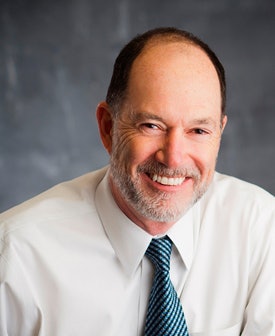SAN ANTONIO — In some ways, college and universities have had tough go of things over the past six months. The new administration’s recent executive order on immigration wrought consternation on many campuses, and debates about free speech have become markedly heated, with a number of institutions experiencing unsettling incidences of violence during institution-sanctioned visits from controversial figures.
 Dr. Kevin Kruger
Dr. Kevin Kruger“These past six months have been a little hard to keep up with,” Dr. Kevin Kruger, president of the Student Affairs Administrators in Higher Education (NASPA) association, admitted at the opening session of NASPA’s annual conference Sunday evening.
In addition to challenges brought about by a rapidly evolving political and cultural landscape, higher ed must also contend with an uncertain financial reality. In total, 36 states have projected deficits for the coming year, Kruger said. Historically, budget shortfalls have had an outsize effect on public institutions of higher education.
In fact, this is currently playing out in states like Missouri, where the governor recently moved to cut $68 million from the state budget for higher education, representing 8 percent of general funding for the state’s colleges and community colleges. For decades, institutions of higher education have seen a decline in state support, a trend that does not appear to be poised to reverse course any time soon.
In some states, the shortfalls are falling most heavily on student affairs professionals. North Dakota State University announced less than a month ago that it would “reorganize” its Division of Students Affairs in an effort to trim its budget, eliminating senior positions and moving some functions to other divisions of the campus.
“I worry that this is the tip of the iceberg,” Kruger said.
Nor are private institutions immune from fiscal challenges — they were also impacted by the slow overall recovery from the recession. “The middle class in the United States has not fully recovered,” Kruger said.
Other demographic changes spell trouble for colleges and universities in states where the population is aging. Since the majority of students attend college less than 60 miles away from their hometowns, according to a 2016 ACE study, institutions in those states are competing for an ever smaller applicant pool.
Despite the turbulent times, institutions are making remarkable advances, Kruger said. “There’s a spirit of innovation and commitment to address systemic issues at our colleges and universities that I’ve not seen in my previous 35 years in this business,” he commented.
In times like these, he argued, the role of student affairs professionals is all the more critical. Student affairs professionals have a responsibility to contribute to dialogues about “issues of race, gender, sexual orientation, and immigration.”
Following Kruger’s remarks, Anderson Cooper delivered the opening session’s keynote address. He focused on the positive advances that humanity has made from the global perspective — a lessening of extreme poverty, and fewer wars overall — while still acknowledging the increasingly “polarized” political landscape of the U.S. He drew parallels between the work that journalists and student affairs professionals do — since both professions involve helping others interpret the world around them.
“So many of our students today are coming of age in extraordinary times with opportunities and challenges that previous generations haven’t faced,” Cooper said. “I think it’s very easy right now to see the world that you’re entering as worse off than ever before, as more polarized, as more difficult.”
Staff writer Catherine Morris can be reached at [email protected].





















